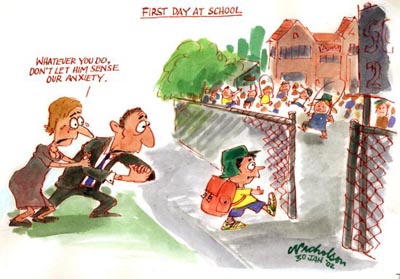by Sue Russoniello
By the time you read this blog post, I’ll be in Italy for the first time. Usually my preparation for a vacation means rushing around at the last minute, throwing in everything I think I might need, which means I over pack and/or forget something vital. I have vowed that this trip is going to be different. Since we’ll be traveling by train and carrying our own luggage from place to place, I’ve checked the weather, carefully considered the activities we’ve planned, and tried to line up a minimal collection of the right clothes and accessories.
As I started making a list for my trip, I thought of other aspects of life where I (and you) should make a concerted effort to plan ahead. For instance, maybe your search for a summer internship, full time job or graduate school applications could use some tweaking. Perhaps you approach important things in your life the same way I pack for vacation — on the day of an interview you throw on a suit, grab your resume and rush out the door thinking you’re ready.
Even now my palms begin to sweat when I remember one particular interview I had many years ago. When I got out of bed that morning, I discovered that it was snowing, and began to panic. I not only had to dress more carefully than usual, but also had to find my boots. Once I got out of the house, I discovered that traffic was horrendous, parking in the city a challenge; I arrived late, rushing up to the receptionist who was waiting for me. She had to wait even longer while I awkwardly exchanged boots for dress shoes and attempted to smooth my hair, feeling discombobulated rather than calm and prepared.
You’ll not be surprised to hear that the interview went terribly. I was so rattled by then, that when I was asked what my then boss would say about me that would make the interviewer want to hire me, (not a terribly difficult or unusual question) I totally froze. Instead of having the composure to carefully promote myself, the few ideas I babbled about just emphasized my lack of readiness and self confidence. I was embarrassed and just wanted it all to be over. On the way home I beat myself up with a dozen things I should have said, and tried to incorporate them into my thank you note. But of course it was too late. In these situations you don’t get a do over, and needless to say, I did not get the job offer.
So what should I have done differently? Why didn’t I plan ahead — listen to the weather report, lay out my clothes (including my boots and gloves) the night before and set an earlier alarm? I should have anticipated the slow traffic and arrived with enough spare time to be able to organize my thoughts as well as my appearance. Setting aside some time to review the job description, my resume and sample interview questions would have helped my chances of landing the job. If only I had scheduled an appointment with a Career Counselor which would have armed me with the self confidence I needed to put my best self forward.
I encourage you to learn from my mistakes. Career Services is open all year, even during the summer, so please call us for assistance with your job or internship search, or graduate school admissions process.
I realize that advance preparation for events, whether it’s a vacation or a job interview, is well worth the time and effort invested. It usually leads to a better outcome, better feelings about yourself, and a much more relaxed and enjoyable journey.
Arrivederci!










